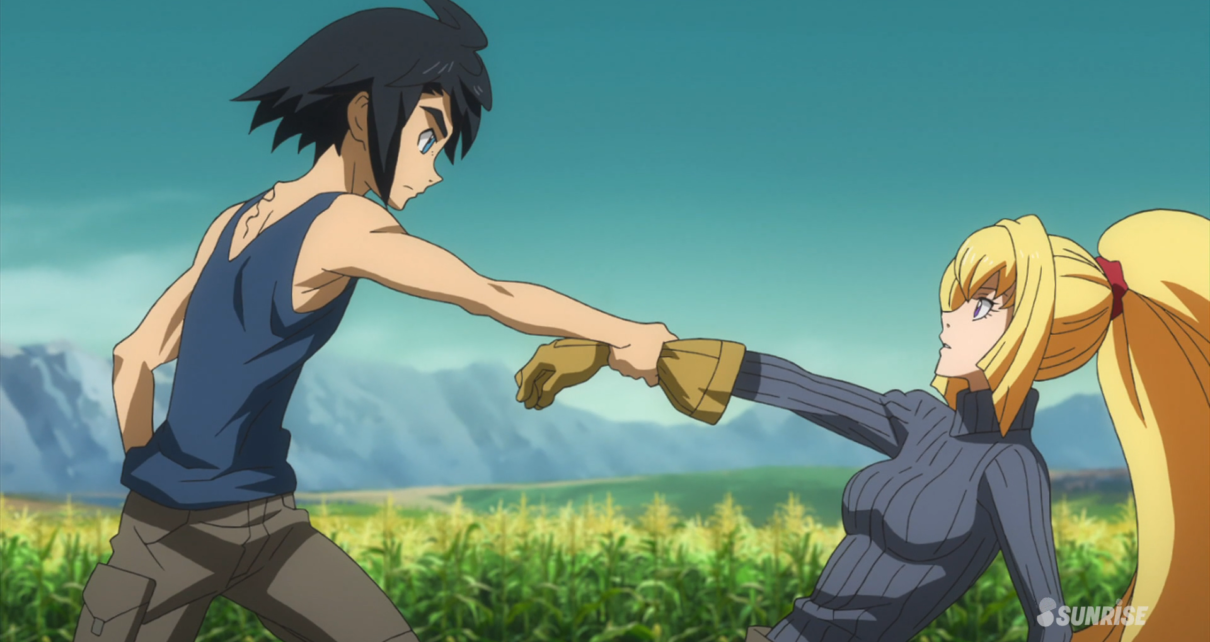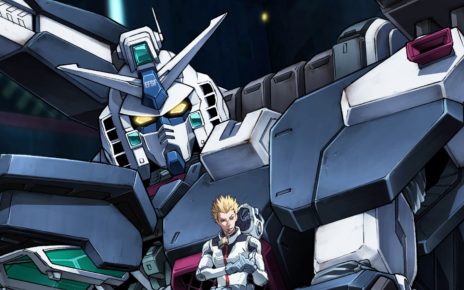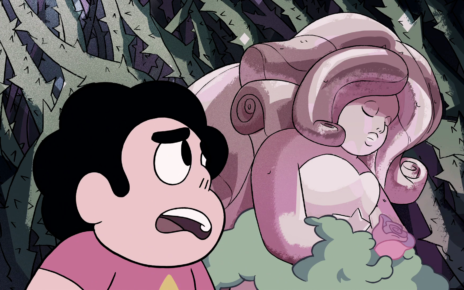By most measures, Mobile Suit Gundam: Iron-Blooded Orphans is a rousing creative and commercial success. Fans — including fellow writers at The Dot and Line — love it. IBO has some of the strongest animation and battle sequences in the entirety of Gundam since the franchise’s debut 40 years ago. There is a respect to weight and physics that you can see in the animation of IBO’s giant robots, ship-to-ship combat, and how the show limits the use of beam and laser projectile weaponry. The melee weaponry is made of heavy metal, and when the Gundam hits stuff, it clangs and thuds the way iron would. Overall, the sound design and music are incredible. Everything in its first season feels finely tuned — from the fights, to the heroes motivations, to the steady escalation of narrative stakes, to the conclusion with a hard-won victory. All of this attention to detail grounds even IBO’s sci-fi excesses or most melodramatic twists.

War Is for Losers is a meditation on Mobile Suit Gundam.
But IBO isn’t perfect. We need to talk about how the show treats its women and how its approach both differs from and reinforces reductive and sexist anime tropes. These feel tired in the 2010s, but they persist nonetheless.
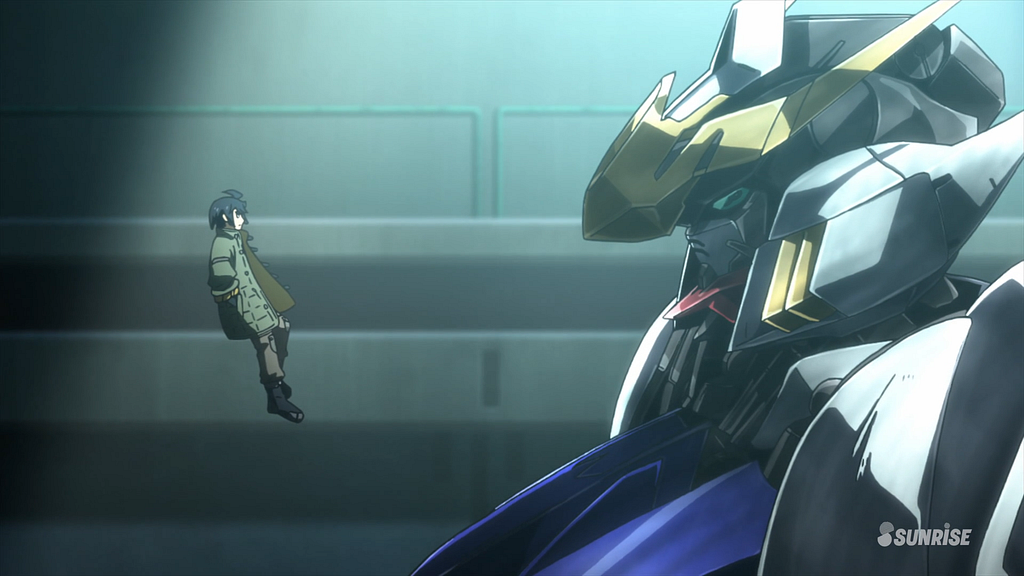
‘IBO’ may be graphic, but its love triangle isn’t exactly “mature”
When it first came out in 2015, IBO began as a more intense take on the original setup of Gundam: the tension between children being forced into a war even as adults tell them they have no business being in that war. That’s a forever trope of Gundam, but IBO took it a step further. This series was about Martian children raised in war and adversity and responding to it by taking it all into their own hands. In the first episode, faced with nothing to lose, the child soldier slaves revolt against their adult masters using the Gundam Barbatos, piloted by the battle-hardened and almost emotionless Mikazuki Augus.
They then bootstrap a mercenary business and rename themselves Tekkadan (“Iron Flower”) on the premise that they hit harder than the competition because the adults forced them to know how. The kids, whom the show refers to as “human debris,” kick royal ass. They took the licks and swung back.
Enter the show’s female lead, Kudelia Aina Bernstein. She becomes this new ragtag crew’s first client, hiring them as bodyguards and escorts. Kudelia is an aristocratic noblewoman who takes a liking to Mikazuki, setting her up as this series’ Relena Peacecraft, the female lead of Gundam Wing and that show’s staunchest pacifist. But IBO didn’t have the same philosophical intentions as Wing or the same level of planning in the long run. For all of Kudelia’s agency, the show undermines it by sticking her and the lower-class Martian Atra Mixta in a love triangle with Mikazuki. That would be fine if it wasn’t entirely predicated on their crushing super hard on a sociopath who doesn’t care about anything at all.
This all comes to a head in a few pivotal episodes
Kudelia grows enamored with Mikazuki in deep space. (At least Atra has context, having known “Mika” for much of their lives.) In episodes 12 and 13, she takes action on her crush, cozying up to him in sequences that feel out of place given the events that occur prior to it.
To understand why it’s weird, you have to understand the events of episodes 11 and 12. A super beefy supporting character in Tekkadan, Akihiro, reunites in battle with his brother, Masahiro, whom he previously thought was dead. After Akihiro and Tekkadan try to liberate Masahiro from his slavemasters, Masahiro dies VISCERALLY (death scenes in this show are heavy on emphasizing people as blood balloons). And Akihiro in his grief adopts the surviving slaves they capture in the battle as surrogate family.
All of this is very emotionally harrowing and a good example of how IBO humanized the brutality of using children to fight battles. The sequence of events left me in tears and is still difficult to revisit. But I’ve been back to those episodes to take a good look at Akihiro’s journey and where his character begins to develop. Every good Gundam pilot deserves a fully fleshed character arc. The relationships feel nuanced, and the weight of their emotions feel thought through.
Kudelia’s infatuation with Mikazuki is what follows, and as a come-down, by comparison, the choice feels clumsy and plodding. The show invests the next few episodes on a shipping attempt that pairs Kudelia with a sociopath whose only motivation and desire is to fight for his pals. The power and class relationship between the two of them also reads as slimy; Mikazuki can’t read and was emotionally stunted from a young age, but Kudelia obsesses over him nonetheless. In just a few scenes, IBO turns an otherwise powerful, unflappable political voice — someone who could be every bit the crusader Relena was in Wing — into a simpering teenage girl looking to kiss a boy.
What makes all this worse is that when Mikazuki does kiss her, he thinks nothing of it. And that moment is painful to watch. Not painful in the same way Masahiro’s death was painful. It’s carve out your fucking eyes cringe painful. Worse yet, it’s sort of forgotten and tossed off generally afterward…? And of course that makes sense, it’s war after all, but for pacing and how it’s written, it all feels very out of place.
All the while, the show conveniently shunts Atra out of the way so that she can cook for everybody in Tekkadan, ticking off another tired anime trope. It should be noted Atra is mistaken for Kudelia a few episodes after this and is tortured for information. It’s a scene where two grown soldiers beat a tied-up 14-year-old girl, and she gives them nothing. So Atra shows her grit, and it’s revealed she used to work as a cleaning girl in a brothel, which gives her more backstory. The backstory is welcome, but why is Atra’s time to shine in the form of a tied-up beating? These are two of the most important women in the show.
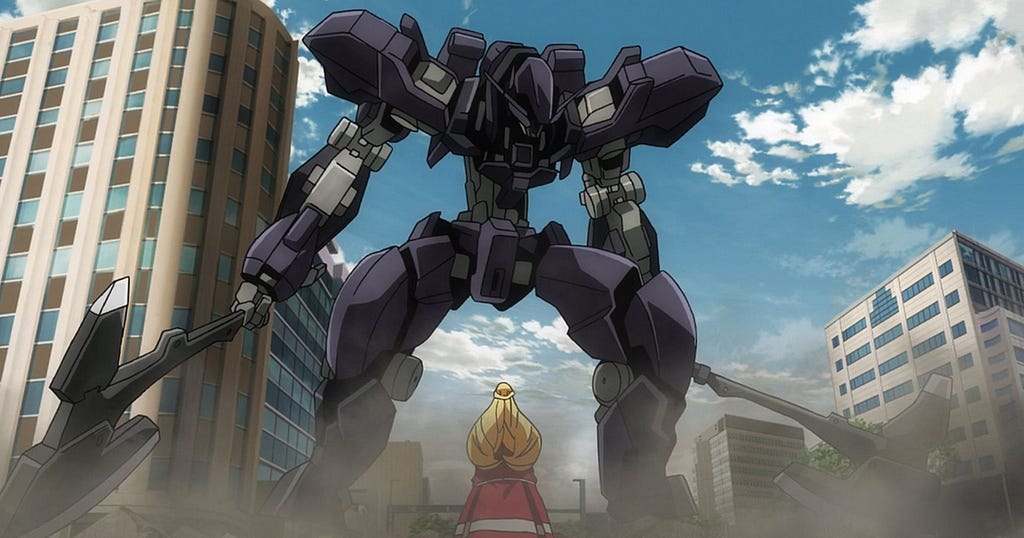
Sidelining women is common in anime, but it doesn’t have to be
To some degree this is expected. The Gundam stories have long been set in patriarchal universes that rarely interrogate the problematic ways those patriarchies shackle or reduce women to rigidly defined roles. It’s not unique among mecha anime in that way, but characters like Gundam Wing’s Relena prove that the series can sometimes undermine those tropes.
We should expect more from IBO. The show dropped in 2015, 20 years after Relena crusaded for peace in Wing. This is a fictional universe set in the far-flung future that takes place on Mars and in space colonies. For 40 years, so many of the Gundam series have repeatedly sidelined their women, with only a handful of exceptions. And when it comes to IBO, when the love triangle is finally resolved in Season 2, the solution isn’t one that materially confronts Mikazuki’s mental or emotional state, but instead is, Let’s have a polyamorous three-way relationship! That may sound progressive, but without the psychological work it’d take to make it healthy, it reads as wish fulfillment for teenage boys. It also results in a teenage pregnancy.
It doesn’t have to be this way. Kudelia could have continued her story and led her movement instead of heel-turning to ogle a boy. She could have deepened her teacherly relationship to Tekkadan as she taught Mikazuki and others to read. And Atra could have taken more ownership of her work independently of a childhood crush on Mikazuki, without (later) becoming pregnant with his child. IBO treats all of its other themes so carefully, but it’s hard not to think it misstepped when it came to these women’s subplots — nowhere moreso than in the writing of these episodes. And more because these episodes are a clear red flag of things to come down the line in the rest of the show.
The story later hits the ground running again. Tekkadan brokers deals and establishes itself as a force to be reckoned with. The political movement started by Kudelia gains steam all over the space colonies (it’s Gundam, so there are always colonies). The fights get bigger and harder. These kids struggle to make ends meet even as their ranks thin out. The adults all talk about dollars and cents while the kids are trying to prove that they’re just real people.
And that’s what makes Kudelia’s role frustrating. Season 1 is otherwise the simplest and most effective Gundam series I’ve ever seen that wholly embraces the idea of children at war. The premise and the realist approach in the heavy physics make every fight feel really hard-won and keep the stakes high. And then you have this strong female lead, with a strong philosophical stance who acts as conscience to Tekkadan, and she completely breaks character to score Mika’s deets during what she should and normally would understand as a time of mourning, throwing off the pacing of the season.
IBO is an incredible show. With one choice, it disappointed me.
Thanks for reading The Dot and Line, where we talk about animation of all kinds. Don’t forget to follow us on Twitter and sign up for our newsletter.


